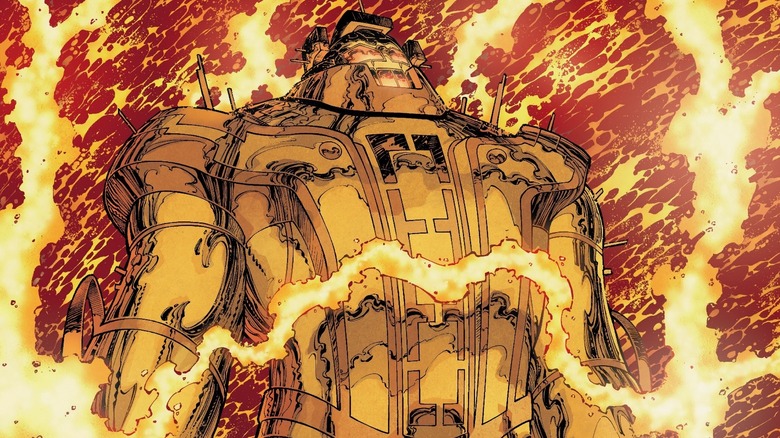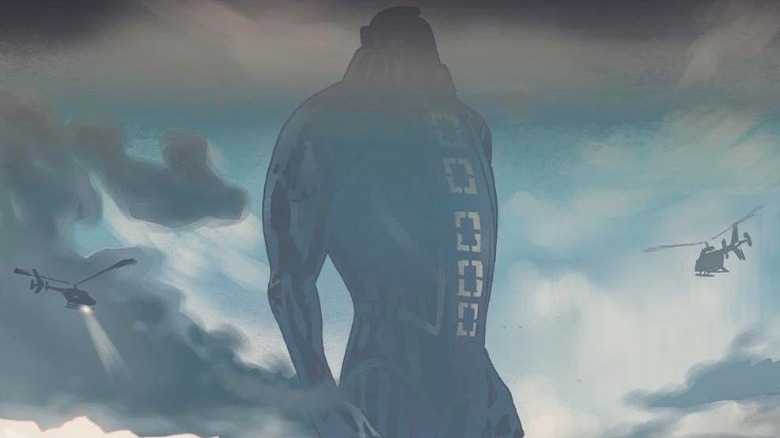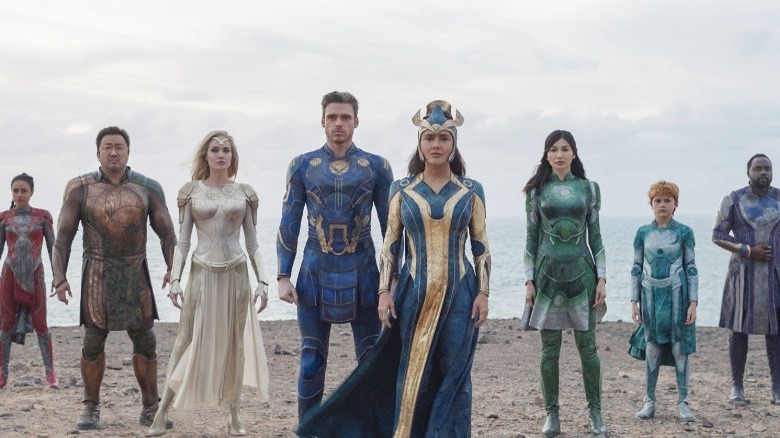Who Is Tiamut In Eternals? Explaining The Celestial
Marvel's "Eternals" is now playing in theaters and is stirring up all sorts of debate about topics ranging from the movie's critical reception to its game-changing revelations about the history of the Marvel Cinematic Universe and what they mean for the future. The film revolves around the titular characters, a group of immortal(-ish) humanoid aliens from the planet Olympia who boast a range of super-powers, be they super-speed, mind control, or the ability to project cosmic energy. Yet, as powerful as the Eternals as, they've got nothing on their creators: the Celestials.
Ancient cosmic beings with god-level powers that've been around since (more or less) the start of time, the Celestials not only helped to create other universes but the greater multiverse in Marvel's comic books. Their ranks include Tiamut the Communicator, a being also known as the Dreaming Celestial, who plays a vital role in the story for "Eternals."
So, before you head out to see the movie, here's a quick, spoiler-free intro to Tiamut for your convenience.
What Is Tiamut's Origin Story?
Tiamut first appeared in 1977's "Eternals" #18 and is seemingly among the most powerful Celestials, even inspiring fear in the cosmic planet-killing being Galactus (who has yet to appear in the MCU). According to Tiamut, the other Celestials joined forces against him after he attacked Arishem the Judge — one of the rare Celestials allowed to judge whether a planet's dominant civilization should live or die — for canceling his order to begin harvesting Earth. They then tore Tiamut's spirit from his body and locked it away in a container known as The Vial before sealing his physical form within the planet under the Diablo Mountain range in California.
A very, very long time later, the infamous San Francisco earthquake of 1906 (the biggest to ever hit the city on-record) was strong enough to damage the chamber where Tiamut's body resided, forcing the Eternals to repair it and keep him imprisoned. There were other close calls over the years that followed before Tiamut was eventually reawakened with the help of the Eternals' evil counterparts, the Deviants. However, instead of immediately destroying Earth as he once planned, the Celestial decided he would judge whether humankind should live or die for himself.
What To Expect From Tiamut In Eternals
As is typical for an MCU movie, "Eternals" remixes certain aspects of Marvel's dense comic book mythology while remaining faithful to other elements. In the film, Arishem is the Celestial responsible for creating the Eternals and, in the year 5,000 BC, sending them to Earth to kill off the Deviants —parasitic beings that invade planets and destroy their apex predators in order to take on their most useful characteristics and wipe out other forms of self-aware life. Upon accomplishing their mission (or so they believe) in the year 1500, the Eternals go their separate ways after clashing over their opinions about whether they should continue to avoid interfering in the affairs of humankind as instructed or guide them in their evolution.
In the present-day, however, everything changes when the Deviants suddenly resurface, forcing the Eternals to reunite in the face of what they gradually come to realize is a far greater threat that (as you've no doubt pieced together) involves Tiamut. But if you want to know how the story unfolds from there, you'll have to check out Chloé Zhao's millennium-spanning, divisive, and more than a little ambitious superhero epic for yourselves.


